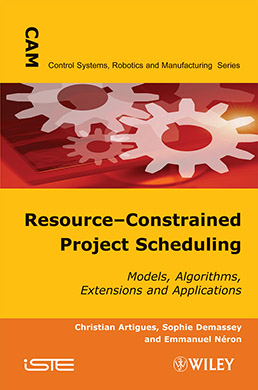
This title presents a large variety of models and algorithms dedicated to solving one of the most important problems in project management, manufacturing and resource optimization; the resource-constrained project scheduling problem (RCPSP), which aims to schedule at minimal duration a set of activities subject to precedence constraints and the limited availability of resources.
Part 1 presents and analyzes the standard variant of the RCPSP as a combinatorial optimization problem. Constraint programming and integer linear programming formulations are given. Relaxations based on these formulations and also on related scheduling problems are presented. Exact methods and heuristics are surveyed. Computational experiments, aiming at providing an empirical insight on the difficulty of the problem, are provided.
Part 2 focuses on several other variants of the RCPSP and their solution methods. Each variant takes account of real-life characteristics which are not considered in the standard version, such as possible interruptions of activities, production and consumption of resources, cost-based approaches and uncertainty considerations.
Part 3 presents industrial case studies in which the RCPSP plays a central role. Applications are presented in various domains such as assembly shop and rolling ingots production scheduling, project management in information technology companies and instruction scheduling for VLIW processor architectures.
Part 1. Models and Algorithms for the Resource-constrained Project Scheduling Problem
1. The Resource-constrained Project Scheduling Problem, Christian Artigues.
2. Resource and Precedence Constraint Relaxation, Emmanuel Néron.
3. Mathematical Programming Formulations and Lower Bounds, Sophie Demassey.
4. Constraint Programming Formulations and Filtering Algorithms, Philippe Laborie and Wim Nuijten.
5. Branching Schemes for Branch-and-Bounds, Emmanuel Néron.
6. Heuristics, Christian Artigues and David Rivreau.
7. Benchmark Instance Indicators and Computational Comparison of Methods, Christian Artigues, Oumar Koné, Pierre Lopez, Marcel Mongeau, Emmanuel Néron and David Rivreau.
Part 2. Variants and Extensions
8. Preemptive Activities, Jean Damay.
9. Multi-mode and Multi-skill Project Scheduling Problem, Odile Bellenguez and Emmauel Néron.
10. Project Scheduling with Production and Consumption of Resources, Jacques Carlier, Aziz Moukrim and Huang Xu.
11. Activity Insertion Problem in RCPSP with Minimum and Maximal Time Lags, Christian Artigues and Cyril Briand.
12. Reactive Approaches, Narendra Jussien and Christelle Guéret.
13. Proactive-reactive Project Scheduling, Erik Demeulemeester, Willy Herroelen and Roel Leus.
14. RCPSP with Financial Costs, Laure-Emmanuelle-Drezet.
Part 3. Industrial Applications
15. Assembly Shop Scheduling, Michel Gourgand, Nathalie Grangeon and Sylvie Norre.
16. Employee Scheduling in an IT Company, Laure-Emmanuelle Drezet and Jean-Charles Billaut.
17. Rolling Ingots Production Scheduling, Christoph Schwindt and Norbert Trautmann.
18. Resource-constrained Modulo Scheduling, Christian Artigues, Sadia Azem and Benoit Dupont de Dinechin.
Christian Artigues is a researcher at the Laboratory for Analysis and Architecture of Systems (LAAS) of the French National Institute for Scientific Research (CNRS).
Sophie Demassey is an Assistant Professor at the School of Mining Engineering (EMN), Nantes, France.
Emmanuel Néron is Assistant Professor at the Computer Science Department of Polytech'Tours, France, and is a member of the Computer Science Laboratory of the University of Tours, France.